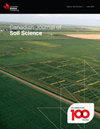不同轮作位置冬小麦土壤结构无差异
IF 1.5
4区 农林科学
Q4 SOIL SCIENCE
引用次数: 1
摘要
小麦后生产量下降通常是由于真菌病的发生,但也发现没有明显的疾病感染。因此,我们假设,其他因素如氮供应或土壤结构退化可能导致小麦后茬产量下降。本研究的目的是分析(i)冬小麦轮作位置是否导致生长季节开始时土壤结构的差异,以及(ii)土壤结构是否与该日期小麦生物量形成的差异有关。通过两个长期对比土壤质地的田间试验,研究了冬小麦条件下不同轮作位置(单作、一麦、二麦和油菜后三麦)小麦的土壤结构特性和地上总生物量。在两个试验点,轮作位置对土壤结构参数的影响均不显著。油菜后栽培的小麦春季生物量比油菜后栽培的二、三种小麦或单作小麦平均高54%。综上所述,春播后茬小麦的生长减少与土壤结构无关。本文章由计算机程序翻译,如有差异,请以英文原文为准。
No differences in soil structure under winter wheat grown in different crop rotational positions
Yield decline in wheat grown after wheat is frequently attributed to fungal disease occurrence, but it is also found without visible disease infection. Thus it is hypothesized, that other factors such as N supply or soil structural degradation may lead to wheat yield decline when grown after wheat. The aims of this study were to analyze if (i) the crop rotational position of winter wheat causes differences in soil structure at the beginning of the growing season and (ii) the soil structure is related to differences in wheat biomass formation by this date. Different soil structural properties under winter wheat as well as total aboveground biomass of wheat grown in different crop rotational positions (monoculture, first, second and third wheat after oilseed rape) were investigated in two long-term field experiments with contrasting soil texture. At both field sites no significant effect of the crop rotational position in any of the analyzed soil structural parameters was found. Wheat biomass in spring was on average 54% higher for wheat grown after oilseed rape compared to second and third wheat after oilseed rape or monoculture. In conclusion, growth reduction of wheat cultivated after wheat was not linked to soil structure as measured in spring.
求助全文
通过发布文献求助,成功后即可免费获取论文全文。
去求助
来源期刊

Canadian Journal of Soil Science
农林科学-土壤科学
CiteScore
2.90
自引率
11.80%
发文量
73
审稿时长
6.0 months
期刊介绍:
The Canadian Journal of Soil Science is an international peer-reviewed journal published in cooperation with the Canadian Society of Soil Science. The journal publishes original research on the use, management, structure and development of soils and draws from the disciplines of soil science, agrometeorology, ecology, agricultural engineering, environmental science, hydrology, forestry, geology, geography and climatology. Research is published in a number of topic sections including: agrometeorology; ecology, biological processes and plant interactions; composition and chemical processes; physical processes and interfaces; genesis, landscape processes and relationships; contamination and environmental stewardship; and management for agricultural, forestry and urban uses.
 求助内容:
求助内容: 应助结果提醒方式:
应助结果提醒方式:


